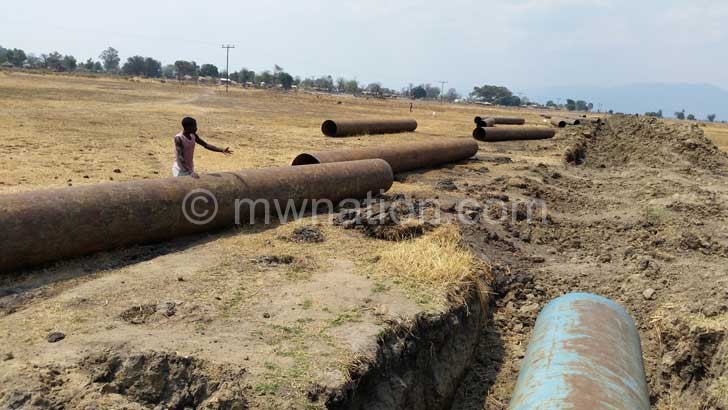K5.5bn irrigation project stalls
Seven years after the date the first phase of the $10 million (about K5.5 billion) irrigation project was scheduled to be completed, the project has stalled.
In 2002, Ministry of Agriculture, Irrigation and Water Development’s Small Farms Irrigation Project got a loan from the Arab Bank for Economic Development in Africa (Badea) to develop irrigation schemes covering 1 600 hectares at Nkopola in Mangochi and Lweya in Nkhata Bay.
Project activities under the first phase, whose objective was to improve food security of 4 000 households, were scheduled to end in 2008.
However, during a recent visit to Nkopola, it was established that the project was rocked with technical hitches.
Pipes meant for the project were corroded and being repaired on a 1 000-metre stretch while those at the intake broke down.
The canals, flow control structures and drains are also in bad shape.
Ironically, government pays between K200 000 and K800 000 per month to Electricity Supply Corporation of Malawi (Escom).
Department of Irrigation and Water Development spokesperson Mercy Jalazi said in the meantime, government has re-engaged Badea for more funding.
“During the course of project’s implementation, it was realised that the allocated funds were not sufficient for the construction of the pumping stations for the entire 1 600 hectares. Government, therefore.re-engaged Badea to borrow $10 million to develop the remaining area. Government has contributed $3.3 million,” she said.
In phase one, the schemes were supposed to have irrigation and drainage networks and ancillary facilities consisting of intake facilities, pumping houses, pipelines, night storage reservoirs, canals, flow control structures, drains and scheme roads.
However, authorities are failing to start phase two, which was scheduled to take off in 2013, because phase one is yet to complete.
Jalazi dismissed suggestion that sub-standard materials were used on the project. She said most of the challenges are as a result of corrosion, budgetary shortfalls, high project staff turn-over and delay in electricity connection, among others.
She admitted that electricity bills go as high as K800 000 in a month, more specifically in the 2012/2013 financial year, but was quick to clarify that the Ministry asked Escom to temporarily suspend billing until the scheme becomes operational.
“The bills that had accumulated were paid for by the project,” she said.
Jalazi however said the ministry has engaged a contractor to rectify the defects and train farmers in operating and maintenance of pumps.
“It has been proposed that the corroded section should be raised above the ground level and anchored on concrete support pillars or replaced with a non-reactive pipe material,” she said.
However, farmers in the area feel cheated by government and demand answers on the project.
“Government needs to come out in the open and tell us if this project will materialise. People need to move on with their lives and not bank on something that might not work,” said Wadi Usupu, committee member of Nkopola Irrigation Scheme.





